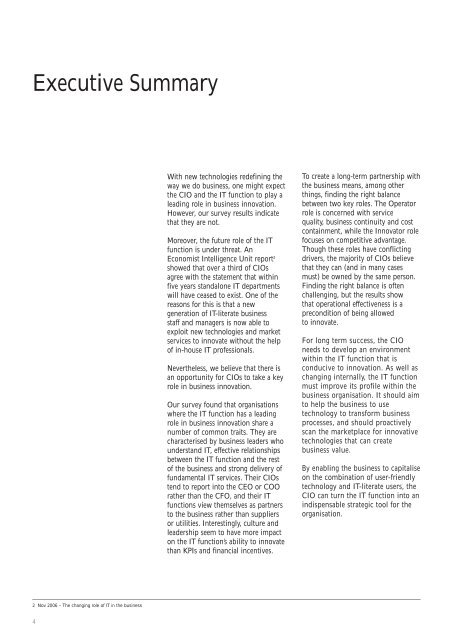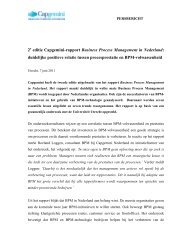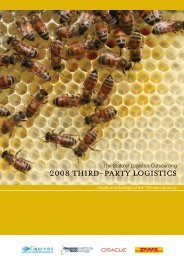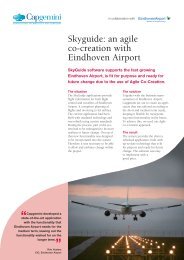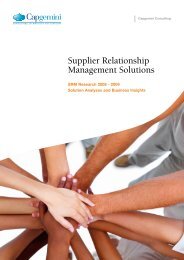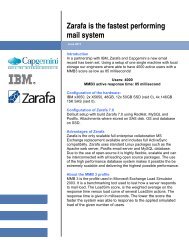Global CIO Survey 2008 - Innovator vs Operator - Capgemini
Global CIO Survey 2008 - Innovator vs Operator - Capgemini
Global CIO Survey 2008 - Innovator vs Operator - Capgemini
- No tags were found...
You also want an ePaper? Increase the reach of your titles
YUMPU automatically turns print PDFs into web optimized ePapers that Google loves.
Executive SummaryWith new technologies redefining theway we do business, one might expectthe <strong>CIO</strong> and the IT function to play aleading role in business innovation.However, our survey results indicatethat they are not.Moreover, the future role of the ITfunction is under threat. AnEconomist Intelligence Unit report 2showed that over a third of <strong>CIO</strong>sagree with the statement that withinfive years standalone IT departmentswill have ceased to exist. One of thereasons for this is that a newgeneration of IT-literate businessstaff and managers is now able toexploit new technologies and marketservices to innovate without the helpof in-house IT professionals.Nevertheless, we believe that there isan opportunity for <strong>CIO</strong>s to take a keyrole in business innovation.Our survey found that organisationswhere the IT function has a leadingrole in business innovation share anumber of common traits. They arecharacterised by business leaders whounderstand IT, effective relationshipsbetween the IT function and the restof the business and strong delivery offundamental IT services. Their <strong>CIO</strong>stend to report into the CEO or COOrather than the CFO, and their ITfunctions view themselves as partnersto the business rather than suppliersor utilities. Interestingly, culture andleadership seem to have more impacton the IT function’s ability to innovatethan KPIs and financial incentives.To create a long-term partnership withthe business means, among otherthings, finding the right balancebetween two key roles. The <strong>Operator</strong>role is concerned with servicequality, business continuity and costcontainment, while the <strong>Innovator</strong> rolefocuses on competitive advantage.Though these roles have conflictingdrivers, the majority of <strong>CIO</strong>s believethat they can (and in many casesmust) be owned by the same person.Finding the right balance is oftenchallenging, but the results showthat operational effectiveness is aprecondition of being allowedto innovate.For long term success, the <strong>CIO</strong>needs to develop an environmentwithin the IT function that isconducive to innovation. As well aschanging internally, the IT functionmust improve its profile within thebusiness organisation. It should aimto help the business to usetechnology to transform businessprocesses, and should proactivelyscan the marketplace for innovativetechnologies that can createbusiness value.By enabling the business to capitaliseon the combination of user-friendlytechnology and IT-literate users, the<strong>CIO</strong> can turn the IT function into anindispensable strategic tool for theorganisation.2 Nov 2006 – The changing role of IT in the business4


